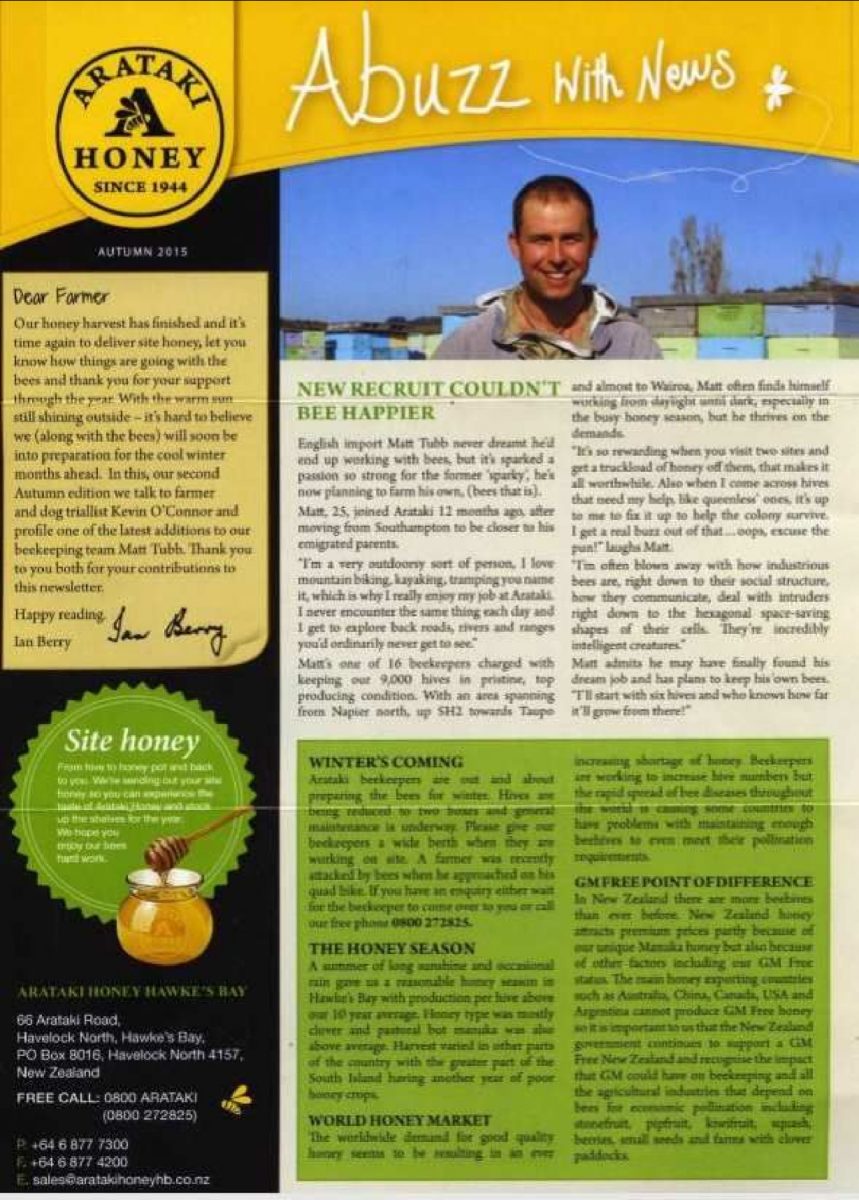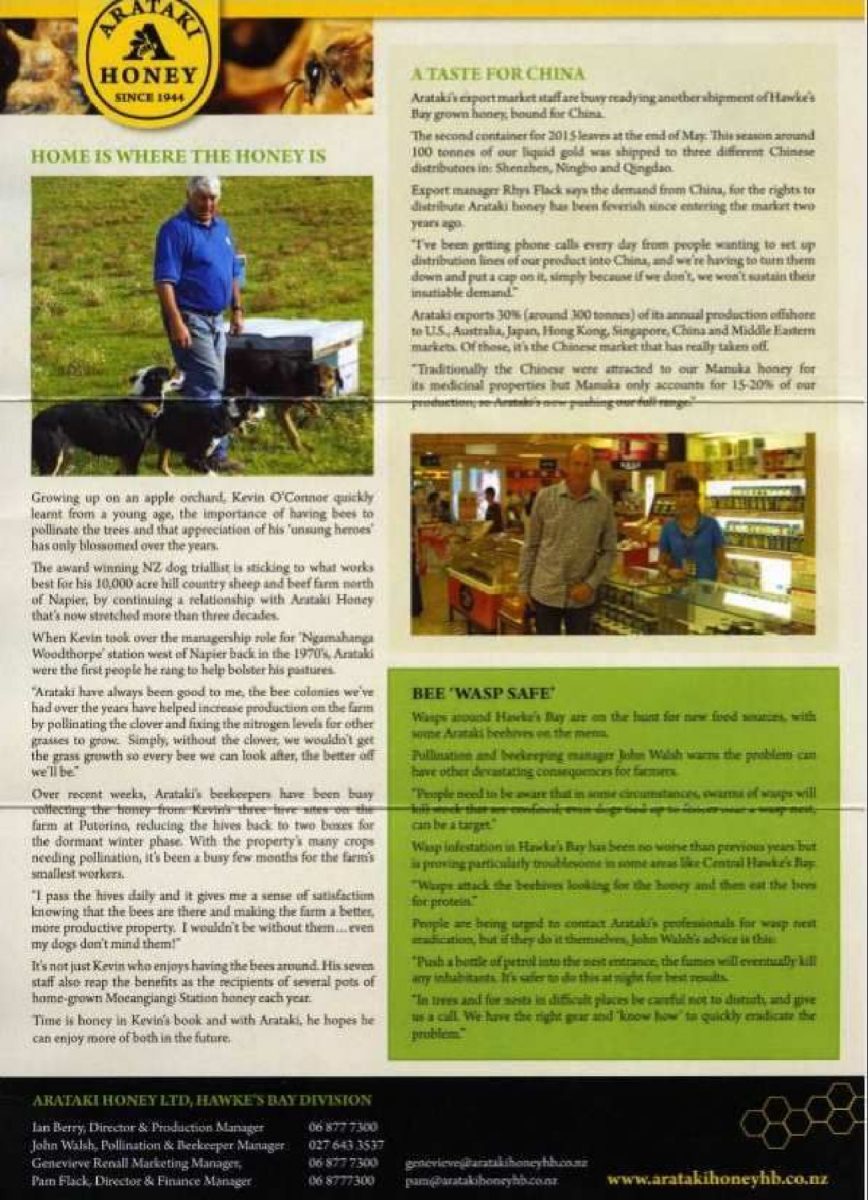Abuzz with news
ARATAKI HONEY SINCE 1944
AUTUMN 2015
Dear Farmer
Our honey harvest has finished and it’s time again to deliver site honey, let you know how things are going with the bees and thank you for your support through the year. WIth the warm sun still shining outside – its hard to believe we (along with the bees) will soon be into preparation for the cool winter months ahead. In this, our second Autumn edition we talk to farmer and dog triallist Kevin O’Connor and profile one of the latest additions to our beekeeping team Matt Tubb. Thank you to you both for your contributions to this newsletter.
Happy reading
Ian Berry.
SITE HONEY
From hive to honey pot and back to you. We’re sending out your site honey so you can experience the taste of Arataki honey and stock up the shelves for the year. We hope you enjoy our bees hard work.
ARATAKI HONEY HAWKE’S BAY
66 Arataki Road,
Havelock North, Hawke’s Bay,
PO Box 8016, Havelock North 4157,
New Zealand
FREE CALL: 0800 ARATAKI
(0800 272825)
P +64 6 877 7300
F +64 6 877 4200
E sales[@]aratakihoneyhb.co.nz
NEW RECRUIT COULDN’T BEE HAPPIER
English import Matt Tubb never dreamt he’d end up working with bees, but it’s sparked a passion so strong for the former ‘sparky’ he’s now planning to farm his own, (bees that is). Matt, 25, joined Arataki 12 months ago, after moving from Southampton to be closer to his emigrated parents. “I’m a very outdoorsy sort of person, I love mountain biking, kayaking, tramping you name it, which is why I really enjoy my job at Arataki. I never encounter the same thing each day and I get to explore back roads, rivers and ranges you’d ordinarily never get to see.” Matt’s one of 16 beekeepers charged with keeping our 9,000 hives in pristine, top producing condition. With an area spanning from Napier north, up SH2 towards Taupo and almost to Wairoa, Matt often finds himself working from daylight until dark, especially in the busy honey season, but he thrives on the demands.
“It’s so rewarding when you visit two sites and get a truckload of honey off them, that makes it all worthwhile. Also when I come across hives that need my help, like queenless ones, it’s up to me to fix it up to help the colony survive. I get a real buzz out of that. . .oops, excuse the pun!” laughs Matt.
“I”m often blown away with how industrious bees are, right down to their social structure, how they communicate, deal with intruders right down to the hexagonal space-saving shapes of their cells. They’re incredibly intelligent creatures”.
Matt admits he may have finally found his dream job and has plans to keep his own bees. “I’ll start with six hives and who knows how far it’ll grow from there!”.
WINTER’S COMING
Arataki beekeepers are out and about preparing the bees for winter. Hives are being reduced to two boxes and general maintenance is underway. Please give our beekeepers a wide berth when they are working on site. A farmer was recently attacked by bees when he approached on his quad bike. If you have an enquiry either wait for the beekeeper to come over to you or call our free phone 0800 272825.
THE HONEY SEASON
A summer of long sunshine and occasional rain gave us a reasonable honey season in Hawke’s Bay with production per hive above our 10 year average. Honey type was mostly clover and pastoral but manuka was also above average. Harvest varied in other parts of the country with the greater part of the South Island having another year of poor honey crops.
WORLD HONEY MARKET
The worldwide demand for good quality honey seems to be resulting in an ever increasing shortage of honey. Beekeepers are working to increase hive numbers but the rapid spread of bee diseases throughout the world is causing some countries to have problems with maintaining enough beehives to even meet their pollination requirements.
GM FREE POINT OF DIFFERENCE
In New Zealand there are more beehives than ever before. New Zealand honey attracts premium prices partly because of our unique Manuka honey but also because of other factors including our GM Free status. The main honey exporting countries such as Australia, China, Canada, USA and Argentina cannot produce GM Free honey so it is important to us that the New Zealand government continues to support a GM Free New Zealand and recognise the impact that GM could have on beekeeping and all the agricultural industries that depend on bees for economic pollination including stonefruit, pipfruit, kiwifruit, squash, berries, small seeds and farms with clover paddocks.
ARATAKI HONEY SINCE 1944
HOME IS WHERE THE HONEY IS
Growing up on an apple orchard, Kevin O’Connor quickly learnt from a young age, the importance of having bees to pollinate the trees and that appreciation of his unsung heroes has only blossomed over the years.
The award winning NZ dog triallist is sticking to what works best for his 10,000 acre hill country sheep and beef farm north of Napier, by continuing a relationship with Arataki Honey that’s now stretched more than three decades. When Kevin took over the managership role for ‘Ngamahanga Woodthorpe’ station west of Napier back in the 1970’s, Arataki were the first people he rang to help bolster his pastures.
“Arataki have always been good to me, the bee colonies we’ve had over the years have helped increase production on the farm by pollinating the clover and fixing the nitrogen levels for other grasses to grow. Simply, without the clover, we wouldn’t get the grass growth so every bee we can look after, the better off we’ll be.”
Over recent weeks, Arataki’s beekeepers have been busy collecting the honey from Kevin’s three hive sites on the farm at Putorino, reducing the hives back to two boxes for the dormant winter phase. With the property’s many crops needing pollination, it’s been a busy few months for the farm’s smallest workers.
“I pass the hives daily and it gives me a sense of satisfaction knowing that the bees are there and making the farm a better, more productive property. I wouldn’t be without them … even my dogs don’t mind them!”
It’s not just Kevin who enjoys having the bees around. His seven staff also reap the benefits as the recipients of several pots of home-grown Moeangiangi Station honey each year.
Time is honey in Kevin’s book and with Arataki, he hopes he can enjoy more of both in the future.
A TASTE FOR CHINA
Arataki’s export market staff are busy readying another shipment of Hawke’s Bay grown honey, bound for China.
The second container for 2015 leaves at the end of May. This season around 100 tonnes of our liquid gold was shipped to three different Chinese distributors in: Shenzhen, Ningbo and Qingdao.
Export manager Rhys Flack says the demand from China, for the rights to distribute Arataki honey has been feverish since entering the market two years ago.
“I’ve been getting phone calls every day from people wanting to set up distribution lines of our product into China, and we’re having to turn them down and put a cap on it, simply because if we don’t, we won’t sustain their insatiable demand.”
Arataki exports 30% (around 300 tonnes) of its annual production offshore to U.S., Australia, Japan, Hong Kong, Singapore, China and Middle Eastern markets. Of those, it’s the Chinese market that has really taken off.
“Traditionally the Chinese were attracted to our Manuka honey for its medicinal properties but Manuka only accounts for 15-20% of our production, so Arataki’s now pushing our full range”.
BEE ‘WASP SAFE’
Wasps around Hawke’s Bay are on the hunt for new food sources, with some Arataki beehives on the menu.
Pollination and beekeeping manager John Walsh warns the problem can have other devastating consequences for farmers.
“People need to be aware that in some circumstances, swarms of wasps will kill stock that are confined, even dogs tied up to fences near a wasp nest can be a target.”
Wasp infestation in Hawke’s Bay has been no worse than previous years but is proving particularly troublesome in some areas like Central Hawke’s Bay.
“Wasps attack the beehives looking for the honey and then eat the bees for protein.”
People are being urged to contact Arataki’s professionals for wasp nest eradication, but if they do it themselves, John Walsh’s advice is this: “Push a bottle of petrol into the nest entrance, the fumes will eventually kill any inhabitants. It’s safer to do this at night for best results.
“In trees and for nests in difficult places be careful not to disturb, and give us a call. We have the right gear and ‘know how’ to quickly eradicate the problem.”
ARATAKI HONEY LTD, HAWKE’S BAY DIVISION
Ian Berry, Director & Production Manager 06 877 7300
John Walsh, Pollination & Beekeeper Manager 027 643 3537
Genevieve Renall, Marketing Manager, 06 877 7300 genevieve[@]aratakihoneyhb.co.nz
Pam Flack, Director & Finance Manager 06 8777300 pam[@]aratakihoneyhb.co.nz
www.aratakihoneyhb.co.nz













Do you know something about this record?
Please note we cannot verify the accuracy of any information posted by the community.